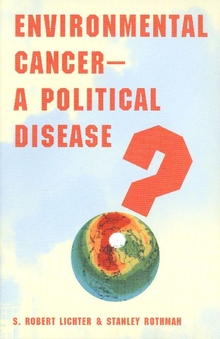Environmental Cancer—A Political Disease?
WARNING
You are viewing an older version of the Yalebooks website. Please visit out new website with more updated information and a better user experience: https://www.yalebooks.com
S. Robert Lichter and Stanley Rothman
In this provocative book, S. Robert Lichter and Stanley Rothman examine the controversies surrounding environmental cancer and place them in historical perspective. Then, drawing on surveys of cancer researchers and environmental activists, they reveal that there are sharp differences between the two groups` viewpoints on environmental cancer. Despite these differences, a further comparison—between the views of the two groups and the content of television and newspaper accounts over a two-decade period—shows that press reports most frequently cite the views of environmental activists as if they were the views of the scientific community. These findings cast doubt on the objectivity of the news media and environmental activists. And, the authors conclude, misplaced fears about the risks of environmental cancer have seriously distorted public policy and priorities.
A selection of the Conservative Book Club
"After reading Environmental Cancer you will view the activities of self appointed 'environmentalists’ through a whole new lens. Lichter and Rothman meticulously contrast the positions of the scientific community about the causes of human cancer—with those of environmental activists. In the dichotomy of views which emerges, we clearly see a clash of scientific realities and ideological fueled agendas."—Elizabeth Whelan, President, American Council on Science and Health
"Drs. Lichter and Rothman’s new book is an anatomy of the environmental movement—a dissection of the multifaceted layers of premises, ideologies and agendas which appear to motivate those who point to ’the environment’ as a cause of human disease."—Elizabeth Whelan, President, American Council on Science and Health
"Environmental Cancer is the clear antidote for those who are bewildered by conflicting reports in the media about what does and does not cause human cancer. Drs. Lichter and Rothman present an insightful, thoroughly researched and highly readable evaluation of today’s environmental movement—and the political agenda which fuels it."—Elizabeth Whelan, President, American Council on Science and Health
"A fascinating and provocative book that is bound to generate interest, controversy, and debate."—John D. Graham, director, Harvard Center for Risk Analysis
"An interesting and provocative book. I think he gets some things wrong in the introductory background chapters, but his own analysis are worth discussion and debate. I’ve suggested it to several colleagues, including Frances Lynn, whose work he should have cited."—Richard Andrews, University of North Carolina
"Excellent intro to the political issues arising from use of risk assessment in regulatory politics."—Walter Rosenbaum, University of Florida
“[Litchner and Rothman] have created a tightly written, highly readable examination of the controversy surrounding environmental cancer and the great abyss between the realities of hard science and the cancer ‘crisis of the week’ reports from assorted activist groups and journalists.”—Conrad F. Meier, Ideas on Liberty
“A fascinating and unique book, full of insights and interesting analysis, that offers important lessons and raises disturbing questions about the future of science.”—James T. Bennett, Isis
"A readable and believable presentation that is challenging to antagonists and painfully sobering to proponents of the thesis. . . . The challenge in reading this book is to lay aside our preconceived notions, understand the author’s thesis, review their survey data, and then reach a reasoned conclusion. I urge physicians who treat patients to take up this challenge."—James W. Allen, JAMA
"Anyone interested in issues of health and environmental causes will find this a timely, important title."—Reviewers Bookwatch
"There is a yawning divide between the realities of hard science and the scary reports from various activists and reporters. Environmental Cancer does a tremendous service in separating fact from fiction. The authors show how out of touch the activists and 'media elite’ often are."—Michael Fumento, Wall Street Journal
“It seems as if almost every other day we hear about yet another carcinogenic killer brought to you—or so we are led to believe—courtesy of a giant multinational run by fat, cigar-chomping executives wearing $1,200 suits. But how much of what we hear is true? [This book] does a tremendous service in separating fact from fiction. The authors . . . show how out of touch the activists and ‘media elite’ often are.”—Michael Fumento, Wall Street Journal
"Environmental Cancer is filled with historical examples—DDT, Alar, Agent Orange—of what happens when the shared enthusiasm of activists and journalists subverts reason and science: alarm, litigation, regulation, and a vast misallocation of resources, and only much later, the discovery that the original fears had been greatly exaggerated."—Eric S. Cohen, Weekly Standard
"A fascinating overview of how the U.S. came to transfer enormous resources to hypothetical health risks based on assumptions that have proven to be wrong."—Bruce N. Ames, University of California
Publication Date: February 8, 1999
13 b/w illus.


